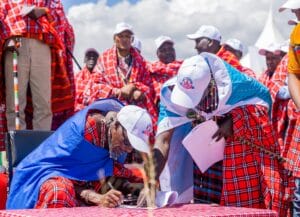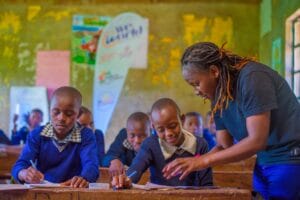
By Annarita Spagnuolo, Kenya country representative for WeWorld
In Nairobi last week there were strong protests involving young people, especially Gen Z, but also Generation X and Millenials, i.e. a large part of the population. After the tensions of the previous days, a return to normalcy was expected, but new protests have been announced for tomorrow.
The imminent approval of the new budget law, which would lead to a further increase in taxes, including on various everyday goods, has led to strong protests across the country, in what appears to be the most violent attack on institutions in decades, which some people are referring to as the "African spring". The expression is a reference to the "Arab Spring", a series of protests in various countries across North Africa and the Middle East between 2010 and 2011.
Thousands of people have taken to the streets in protest over the past few days, particularly on Tuesday 25 June. Despite the resentment of the population at the continuous tax increases since the new government came to power, the demonstration was peaceful (at least on the part of the civilians). However, the police reaction was immediately very strong, escalating the violence and causing several deaths and injuries. At the moment official sources say around 25, although this is not certain, as there is no agreement with the numbers reported by government sources.
Given the peaceful nature of the demonstration, the population was not pleased with the turn it took, with a disproportionate response and use of force by the police, and which, at a later stage, also saw the involvement of armed forces. The speech made by the President on Tuesday further exacerbated the situation. He made no mention of the budget law being passed, dwelling instead on the day's events, labelling the participants in the protests as 'criminals' and announcing harsh punishments for them. Kenyans did not appreciate it.
It was only the next day, Wednesday 26 June, that we saw a turnabout by the President, who delivered a new speech, changing his position: rejecting the budget bill itself, although he had previously made a long speech to justify the increase in taxation on the basis of Kenya's high debt and showing himself open to a new dialogue with the population.
However, contrary to expectations, this did nothing to calm tempers, although there was an improvement in the climate of protests. Further demonstrations took place on Thursday, 27 June, as despite the fact that the President rejected the Budget Law, even opening himself up to dialogue, young people are now tired and no longer willing to accept the opulence with which the political class lives, while the majority of the population struggles to survive, due to the very high costs of common goods and the continuous tax increases that have been going on for the past two years.
The main, and most notable, difference of these protests from previous ones is to be found in the country's rediscovered unity. Within the demonstrations of the last few days there were, as usually happened, no tribal separations as everyone, middle class, young and old, agreed in saying 'Stop! Enough is enough!". In particular, what resonates more and more loudly is a rediscovered awareness on the part of young people, who are more intent than ever to regain not only their present but also, and above all, their future.
The events of the last week greatly impacted on WeWorld's work in the country, as all the various teams in the area had to be called back to safety due to the demonstrations that took place in 34 of the 47 counties. Among the worst affected area were the capital, Nairobi, but also Mombasa and other big cities. It was therefore necessary to stop activities on the ground and, although fortunately these will resume from next week, there will be a lot to rebuild. Many mothers and fathers of families lost their small businesses during the demonstrations, as some took advantage of the situation to give free rein to violence by destroying other people's property. In addition, others lost their lives, and many others were injured.
At present, the atmosphere one breathes is as much one of precariousness and uncertainty as of a desire for a return to normality and revenge, with the awareness and expectation that many things must change: first of all, the dialogue between youth and the political class must be rebuilt. A desire for credibility must be re-established on the part of the government and, at the same time, a willingness to guarantee the present and the future to the young, who are the majority of the population of Kenya and who will not stand by and watch, suffering in silence further abuses by the very authorities that should be protecting and safeguarding them.
Our work in Kenya
We stand by young people. Since 2009, it has been present in the country where it works in an attempt to strengthen their capacities both technically and in terms of dialogue so as to enable them to attend in an increasingly conscious and meaningful way in the creation of policies that benefit them.
In a country like Kenya, where more than 80% of the population is made up of young people, the participation and contribution of the latter in public life is more important than ever, making it imperative to enhance the dialogue between authorities and citizens. Especially considering that young people in Kenya are educated, skilled and creative. They have the strength, and above all, the will to actively participate in the creation of their future and the growth of their country. Nevertheless, unemployment and underemployment are extremely widespread, affecting over 40% of the population, who are thus exposed to crime, exploitation and marginalization. Although the country undertook many reforms several years ago, women and young people still have limited access to resources and their inclusion in the economic and social sphere, although repeatedly announced, and stated, in policies, remains intangible in their daily lives.
WeWorld, in cooperation with other international organizations, institutions and national ministers, is involved in projects to promote access to basic education, maternal and child health care, food security, conflict prevention and peacebuilding initiatives. Particularly with regard to interventions in education, in several counties the organization contributes to the promotion of equitable and quality education, children's health and well-being, and the prevention of absenteeism. It also supports a real school transition that safeguards the rights of students, looking especially at the most vulnerable and marginalized students, monitors and investigates possible abuse and gender-based violence. In Migori and Home Bay counties, our work in more than 19 schools of different grades has resulted in the dissemination of early childhood development policy reform and school health policy, not only helping to better monitor children's health, but also benefiting all those involved in education, from teachers to child protection committees. Since the work began, both counties have made great progress in expanding access to education and strengthening educational policies, but there is still a lot to improve. WeWorld is also active in Narok, where the Kenya Education Sector Strategic Plan was promoted, reaching out to local officials as well, to try to create more effective decision-making, improving planning, monitoring and management of education in the county and spreading a culture that also looks at the protection of young women in the country, who are often victims of genital mutilation, abuse, as well as early marriage and pregnancy. In the field of youth welfare activities, WeWorld's role in Kwale County, where social insecurity is so strong that it fuels extremism and radicalisation, should also be mentioned. This is where the Kujenga Amani Pamoja project takes place, the aim is to promote the learning of peacebuilding practices, conflict prevention and the promotion of inclusiveness, through initiatives linked to the local Swahili culture and through collaboration with youth organizations.
In this as in other projects, however, the active involvement of stakeholders in the political life of the country and in the decision-making apparatus behind it remains fundamental and an integral part of our strategy. It is time for the political class to start dialogue with young people in a meaningful way, making them 100% participants, for a co-creation of their future and of policies that consider their needs and interests.



